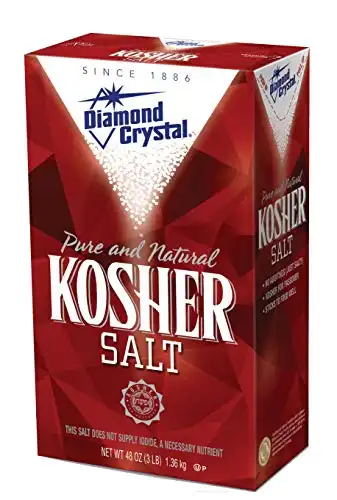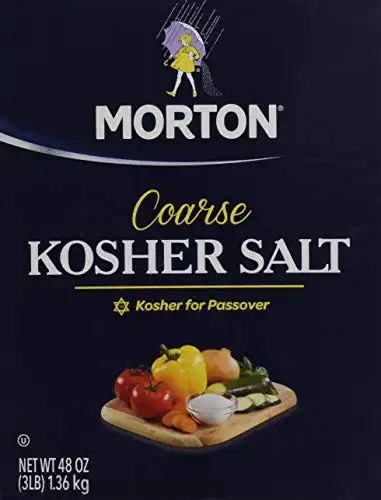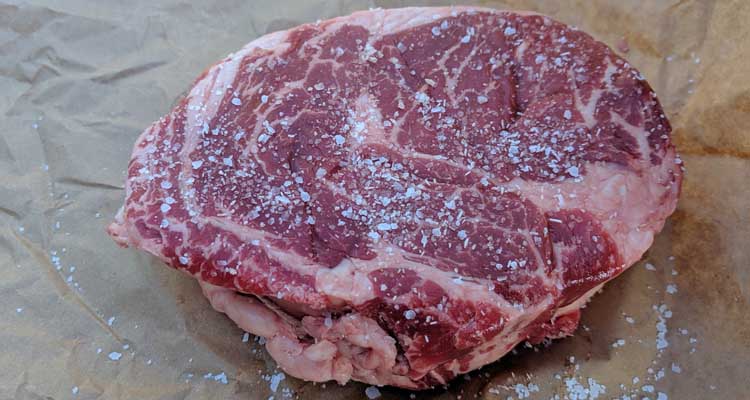What is Kosher Salt?

Replacing table salt with kosher salt can not only improve the tastiness of your dishes, but it can also be a healthier choice.
Let’s take a closer look at what exactly kosher salt is, how it’s different to regular table salt and find out why you need to start using it in your kitchen.
What is Kosher Salt?
Favored by foodies and chefs, kosher salt is a popular choice for anyone who cares about the quality and taste of their seasoning.
Salt is one of the most important ingredients in all styles of barbecue, but especially Texas style bbq, where it’s often one of only three ingredients (salt, black pepper, and meat).
Here’s the lowdown on one of our favorite salts for regular cooking use.
Kosher salt appearance
Unlike refined table salt, kosher salt is a coarse, large-grained salt.
It generally has the appearance of flat, plate-like flakes or it can also come as pyramid-shaped hollows. In fact, you’ll find that kosher salt can vary considerably in looks and density from one brand to another, but the flakes are always larger than table salt crystals.

You will often find kosher salt in professional kitchens where its coarser grains make it much easier to pinch, enabling you to quickly and accurately adjust the amount of seasoning as needed.
Due to the size of its grains, to make the most of seasoning with kosher salt, you’re going to want to invest in a salt box, such as this acacia model, rather than a traditional salt cellar.
Kosher salt taste
Aside from its form, taste is one of the main advantages of cooking with kosher salt.
Unlike table salt, which is often packed with additives and iodine, kosher salt is generally additive-free. This means you are getting a purer salt taste and that the flavor of your meal won’t end up being affected by any bitter, metallic tasting additives typically found in table salt.
In general, the flavor of kosher salt is said to be milder and lighter than table salt. The wider crystals tend to impart a gentler, more subtle saltiness, and if you have a sensitive palate, you will likely be able to tell the difference straight away between a meal prepared using kosher salt and another using table salt.
How kosher salt got its name
Kosher salt acquired its name as it is ideal for drawing fluids from meat, a process known as koshering. So, after having been used for centuries to make meat kosher, the name stuck.
Unless it states on the pack that it is kosher-certified, kosher salt is not actually manufactured in accordance with any religious guidelines as standard. In other parts of the world kosher salt is also known as coarse-grained salt or kitchen salt.
Is kosher salt better for you?
We most definitely think so!
As it is generally additive-free, not only are you not getting a potentially metallic, bitter taste in your meals, you’re also not putting those extra additives inside your body.
While iodine is essential for health, unless your diet is particularly low in iodine, then you don’t need the extra iodine added to table salt. According to the Harvard Medical School,
“Salt provides only a fraction of daily iodine intake for most Americans”
Harvard Medical School – Cut salt – it won’t affect your iodine intake
Additives aside, due to its form and texture, cooking with kosher salt tends to result in meals with a lower overall salt content than when cooking using table salt. As you’re salting by hand and with larger crystals, you automatically tend to use less salt than when shaking a salt cellar.
Density is another factor which makes it much less likely that you will oversalt your food using kosher salt as opposed to table salt.
Kosher salt has a lower density when compared to table salt, so with an equal volume measure of table and kosher salt, the measure of kosher salt will contain less salt.
This makes kosher salt a good choice if you are looking to cut back on your salt consumption levels, without having to compromise on the flavor.
When to use kosher salt
There are many different types of salt that can be used for specialty cooking or to spice up a boring dish. However, kosher salt is perhaps one of the easiest to implement into your daily routine.
For cooking
You can use kosher salt in any recipe where you would use regular table salt, as well as for salting water when boiling pasta or potatoes.
Whenever a recipe calls for a large amount of kosher salt, you will need to pay close attention to the quantities. As volume can vary significantly between brands, you may prefer to measure by weight when possible – as a teaspoon of one brand could contain up to 50% more than another.
For seasoning
If you are using kosher salt to season your meal, you will find that it’s easier and more intuitive to add small pinches to your food, tasting as necessary.
Once you choose a brand and you like, it makes sense to stick to it. That way you’ll get a feel for how much you need to use.
Dry brining
Kosher salt can also be used to dry brine meat or make brining solutions. As it dissolves quickly and easily it is preferable to table salt and you’re more likely to have some to hand than special brining salt.

If you are just starting out brining and are looking for a good all-purpose dry brining guide solution for pork and poultry using kosher salt, take a look at our simple guide right here.
Dry rub
Due to its intense flavor and large grains, kosher salt is an excellent choice for dry rub recipes.

When mixed with herbs and spices, the coarse texture lends a delicious, crunchy coating to meat, that’s sure to be a hit with all your guests. We have some great dry rub recipe ideas here.
For desserts
Savory dishes aside, don’t be frightened to use a little kosher salt in certain desserts for an extra taste dimension.
Kosher salt crystals will dissolve rapidly and evenly in your pie crusts, caramels and cookie doughs, providing a hint of saltiness that balances out the sweetness without overpowering it.
Other uses for kosher salt
Aside from using kosher salt to season your recipes, did you know you can also use it as a versatile grill and kitchen cleaner?
Using kosher salt is an excellent way to clean your cast iron skillets after use. Thanks to its large grains, the salt has an abrasive action, yet when rinsed it dissolves and washes away without leaving a potentially toxic chemical residue, which can often be the case with harsh synthetic kitchen cleaners.
Want to learn more about cleaning up your cast iron cookware with kosher salt? Check out this YouTube video to find out exactly how it’s best done.
Other handy uses for kosher salt include:
- An emergency stain remover for red wine spills – soak up what you can then cover the stain with kosher salt. Leave it to absorb, then vacuum clean.
- A wooden chopping board cleaning scrub – use half a lemon with kosher salt flakes to scrub your wooden chopping board clean, removing any trapped dirt. Rinse when done.
- Remove watermarks and stains on your wooden counters – mix a tiny amount of cold water with kosher salt to form a scrub. Gently rub it over the area with a dishcloth. Once dry restore your wood with polish.
Popular brands of kosher salt
There are many brands of kosher salt to choose from on the market, but two of the most popular brands are Diamond Crystal Kosher Salt and Morton Coarse Kosher Salt.
Diamond Crystal Kosher Salt is natural and completely free from caking agents or additives, as well as being truly kosher for use during Passover. It is endorsed by the American Culinary Association as the kosher salt most preferred by professional chefs across the country.
The salt grains in this kosher salt are coarse and pyramid shaped, so it has an intense flavor well suited to bbq rubs and brining.
Morton Coarse Kosher Salt does contain caking agents, but it is still a delicious and widely popular choice that is also certified kosher.
The grains are finer than Diamond Crystal, which makes it a better choice for beginners who are prone to heavy-handed salting when cooking.
Conclusion
In many ways, it’s clear that kosher salt beats ordinary table salt hands down.
If you’d like to substitute your table salt for kosher salt, due to the differences in flake size, be sure to adjust your quantities when following recipes. A good rule of thumb is to add another ¼ teaspoon of kosher salt for every teaspoon of table salt.
So, there you have it – it might not necessarily be kosher, but with its coarse grains, pinchable flakes and additive-free composition, kosher salt is the best regular cooking salt for your kitchen.
If you want to expand your salt world even further, check out our guide to the 16 different types of salt.
Leave us a comment below and we’ll get back to you!









